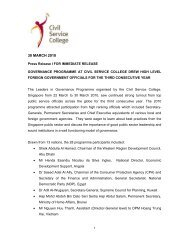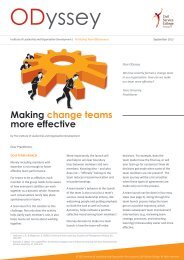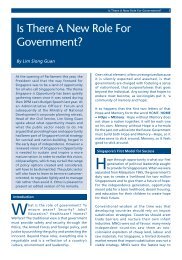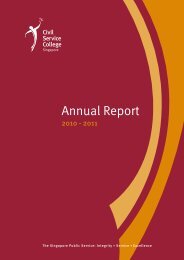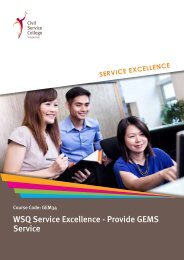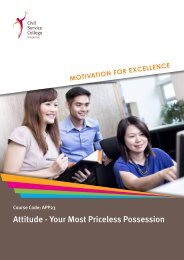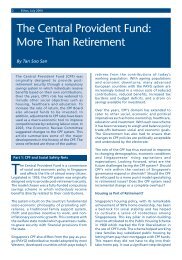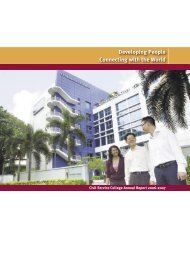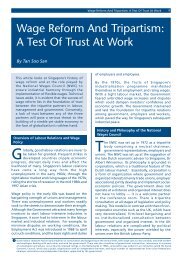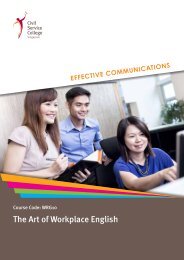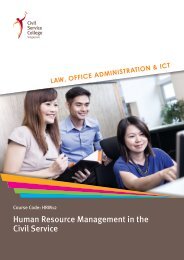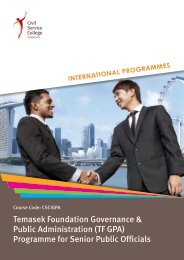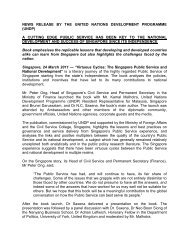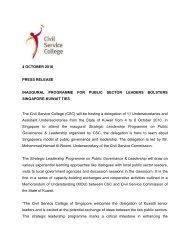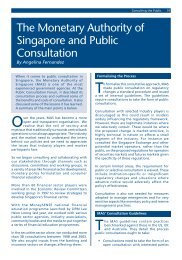Public Consultation Toolkit - Civil Service College
Public Consultation Toolkit - Civil Service College
Public Consultation Toolkit - Civil Service College
Create successful ePaper yourself
Turn your PDF publications into a flip-book with our unique Google optimized e-Paper software.
<strong>Public</strong> <strong>Consultation</strong> <strong>Toolkit</strong> 77 78 <strong>Public</strong> <strong>Consultation</strong> <strong>Toolkit</strong><br />
• Recording – the FGDs should be recorded (taped, transcribed or documented) to ensure<br />
accuracy. These notes can be used for analysis at a later date. Always inform participants if<br />
they are being recorded during the session.<br />
When is it most useful?<br />
• FGDs are most useful when issues need to be explored in-depth, and when there is a need<br />
to understand reasons for attitudes, behaviours or generating new ideas. Agencies are able<br />
to obtain a snapshot of public opinion when time constraints do not allow a full review or<br />
survey.<br />
• FGDs can also be used in conjunction with surveys to identify issues that need to be<br />
quantified, as well as after a survey is conducted to investigate results in greater depth.<br />
Considerations<br />
FGDs may be too small or biased to provide reliable results. Additionally, this method may<br />
involve payment to participants – an appropriate method of payment and amount should be<br />
decided beforehand, and participants should be informed of this.<br />
9. Workshops<br />
A workshop is an informal meeting that includes plenary and<br />
breakout discussion sessions between participants.<br />
A workshop is facilitated by an officer skilled in groupwork,<br />
who can encourage quieter members of the group<br />
to speak up while creating a constructive, problem-solving<br />
atmosphere.<br />
The discussion is focused, but not overly formal, the aim of<br />
which is for everyone to participate comfortably. Workshops<br />
allow individuals to network and exchange ideas and to<br />
develop an action plan recommendations or proposals.<br />
The target audience for this tool is selected individuals with<br />
knowledge and/or experience in the relevant area.<br />
Before conducting workshops, agencies should<br />
determine:<br />
• Topic – agencies need to ensure that the topic is<br />
sufficiently precise and meaningful to participants.<br />
Background information may be sent out to participants<br />
prior to the workshop so that participants are prepared.<br />
• Group sizes – group sizes should be large enough to<br />
encourage lively deliberation, but not so large that most<br />
participants are unable to be involved effectively. The ideal<br />
size would be 15 to 20 participants.<br />
• Venue – ensure the room chosen is of an appropriate size<br />
that will comfortably accommodate the workshop. Ensure<br />
participants with disabilities or special needs have full<br />
access.<br />
• Facilitator – an experienced facilitator will enhance<br />
the quality of the workshop by creating a conducive<br />
environment that encourages discussion, while remaining<br />
neutral. Facilitators must work to keep participants<br />
realistic in the solutions they suggest.<br />
TIPS FOR<br />
EFFECTIVENESS<br />
• Give busy participants<br />
ample notice to allow<br />
them to fit the workshops<br />
into their schedule.<br />
• Ensure that logistical<br />
considerations such as<br />
room availability and food<br />
services are planned well<br />
in advance.



